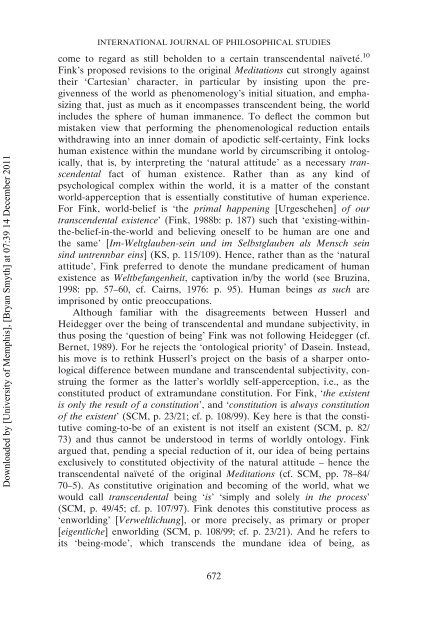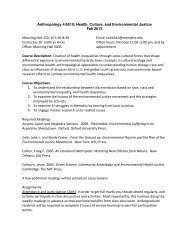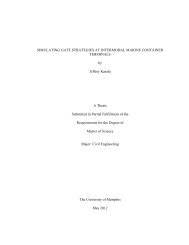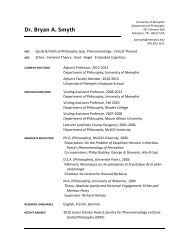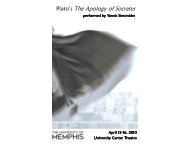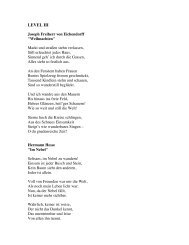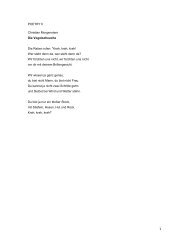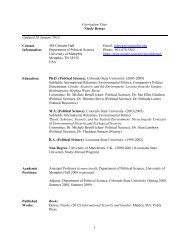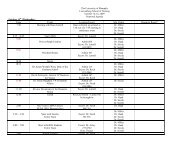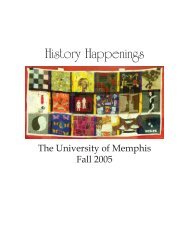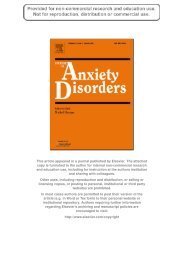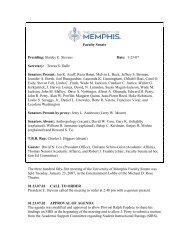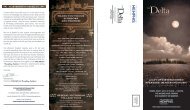The Meontic and the Militant - University of Memphis
The Meontic and the Militant - University of Memphis
The Meontic and the Militant - University of Memphis
You also want an ePaper? Increase the reach of your titles
YUMPU automatically turns print PDFs into web optimized ePapers that Google loves.
Downloaded by [<strong>University</strong> <strong>of</strong> <strong>Memphis</strong>], [Bryan Smyth] at 07:39 14 December 2011<br />
INTERNATIONAL JOURNAL OF PHILOSOPHICAL STUDIES<br />
come to regard as still beholden to a certain transcendental naïveté. 10<br />
Fink’s proposed revisions to <strong>the</strong> original Meditations cut strongly against<br />
<strong>the</strong>ir ‘Cartesian’ character, in particular by insisting upon <strong>the</strong> pregivenness<br />
<strong>of</strong> <strong>the</strong> world as phenomenology’s initial situation, <strong>and</strong> emphasizing<br />
that, just as much as it encompasses transcendent being, <strong>the</strong> world<br />
includes <strong>the</strong> sphere <strong>of</strong> human immanence. To deflect <strong>the</strong> common but<br />
mistaken view that performing <strong>the</strong> phenomenological reduction entails<br />
withdrawing into an inner domain <strong>of</strong> apodictic self-certainty, Fink locks<br />
human existence within <strong>the</strong> mundane world by circumscribing it ontologically,<br />
that is, by interpreting <strong>the</strong> ‘natural attitude’ as a necessary transcendental<br />
fact <strong>of</strong> human existence. Ra<strong>the</strong>r than as any kind <strong>of</strong><br />
psychological complex within <strong>the</strong> world, it is a matter <strong>of</strong> <strong>the</strong> constant<br />
world-apperception that is essentially constitutive <strong>of</strong> human experience.<br />
For Fink, world-belief is ‘<strong>the</strong> primal happening [Urgeschehen] <strong>of</strong> our<br />
transcendental existence’ (Fink, 1988b: p. 187) such that ‘existing-within<strong>the</strong>-belief-in-<strong>the</strong>-world<br />
<strong>and</strong> believing oneself to be human are one <strong>and</strong><br />
<strong>the</strong> same’ [Im-Weltglauben-sein und im Selbstglauben als Mensch sein<br />
sind untrennbar eins] (KS, p. 115/109). Hence, ra<strong>the</strong>r than as <strong>the</strong> ‘natural<br />
attitude’, Fink preferred to denote <strong>the</strong> mundane predicament <strong>of</strong> human<br />
existence as Weltbefangenheit, captivation in/by <strong>the</strong> world (see Bruzina,<br />
1998: pp. 57–60, cf. Cairns, 1976: p. 95). Human beings as such are<br />
imprisoned by ontic preoccupations.<br />
Although familiar with <strong>the</strong> disagreements between Husserl <strong>and</strong><br />
Heidegger over <strong>the</strong> being <strong>of</strong> transcendental <strong>and</strong> mundane subjectivity, in<br />
thus posing <strong>the</strong> ‘question <strong>of</strong> being’ Fink was not following Heidegger (cf.<br />
Bernet, 1989). For he rejects <strong>the</strong> ‘ontological priority’ <strong>of</strong> Dasein. Instead,<br />
his move is to rethink Husserl’s project on <strong>the</strong> basis <strong>of</strong> a sharper ontological<br />
difference between mundane <strong>and</strong> transcendental subjectivity, construing<br />
<strong>the</strong> former as <strong>the</strong> latter’s worldly self-apperception, i.e., as <strong>the</strong><br />
constituted product <strong>of</strong> extramundane constitution. For Fink, ‘<strong>the</strong> existent<br />
is only <strong>the</strong> result <strong>of</strong> a constitution’, <strong>and</strong> ‘constitution is always constitution<br />
<strong>of</strong> <strong>the</strong> existent’ (SCM, p. 23/21; cf. p. 108/99). Key here is that <strong>the</strong> constitutive<br />
coming-to-be <strong>of</strong> an existent is not itself an existent (SCM, p. 82/<br />
73) <strong>and</strong> thus cannot be understood in terms <strong>of</strong> worldly ontology. Fink<br />
argued that, pending a special reduction <strong>of</strong> it, our idea <strong>of</strong> being pertains<br />
exclusively to constituted objectivity <strong>of</strong> <strong>the</strong> natural attitude – hence <strong>the</strong><br />
transcendental naïveté <strong>of</strong> <strong>the</strong> original Meditations (cf. SCM, pp. 78–84/<br />
70–5). As constitutive origination <strong>and</strong> becoming <strong>of</strong> <strong>the</strong> world, what we<br />
would call transcendental being ‘is’ ‘simply <strong>and</strong> solely in <strong>the</strong> process’<br />
(SCM, p. 49/45; cf. p. 107/97). Fink denotes this constitutive process as<br />
‘enworlding’ [Verweltlichung], or more precisely, as primary or proper<br />
[eigentliche] enworlding (SCM, p. 108/99; cf. p. 23/21). And he refers to<br />
its ‘being-mode’, which transcends <strong>the</strong> mundane idea <strong>of</strong> being, as<br />
672


